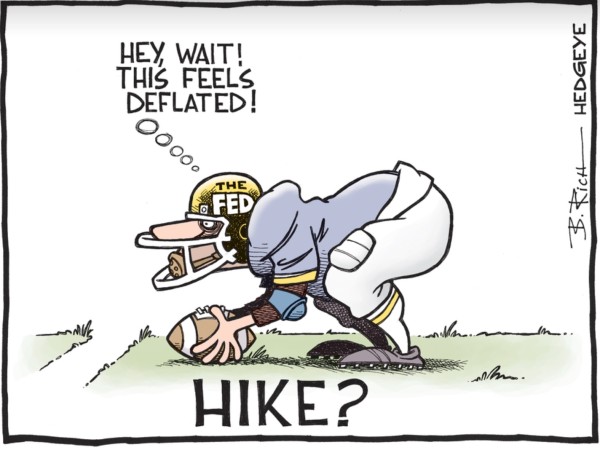The stock market has opened down slightly this morning after a brutal pounding at the end of last week. The conventional wisdom is that collapsing oil prices and the prospect of a Fed interest rate hike this week are the causes, but that’s just a herd of independent minds reinforcing their collective ignorance.
Let me add to the collective ignorance with a nod to J.K. Galbraith’s remark that economic forecasting was invented to make astrology look good. The Wall Street Journal opens this morning with a long feature about the puzzle of low inflation on the eve of the widely expected interest rate hike.
I’ve always been a devotee of Milton Friedman’s axiom that inflation is always and everywhere a monetary phenomena, but with the super low interest rates and massive money-printing going on over the last few years, where is the inflation? As the Journal notes:
“There’s no way in hell anybody reasonably predicted, using the mainstream models, that you would end up with inflation this low,” said Adam Posen, the president of the Peterson Institute for International Economics, a think tank with an international focus.
There are some decent explanations for this not included in the Journal survey (low oil prices; velocity is down; banks and other financial centers are simply stashing the excess cash or buying commodities, etc), and the Journal includes one new one— demographics:
A new theory about low inflation has emerged from former Bank of Japan governor Masaaki Shirakawa. While his former professor, University of Chicago economist Milton Friedman, said inflation could only be caused by a surge in the money supply, Mr. Shirakawa raised demographics as a cause.
Japan’s aging population during the 1990s and 2000s seemed to unleash powerful deflationary forces, according to his theory, by lowering expectations of growth, straining the government’s budget and putting a growing proportion of Japanese consumption in the hands of older people who draw on savings rather than younger wage earners. . .
In 2014, a trio of economists at the International Monetary Fund endorsed many of Mr. Shirakawa’s hypotheses, arguing there are “substantial deflationary pressures from aging” and that “this applies not just to Japan, but also to other countries with aging or declining populations.”
Not sure this is persuasive, but it’s worth pondering. We’ll see if further research can validate this hypothesis.
But it’s the last paragraph of the article that ought to set off alarm bells:
Since the 2007-2009 financial crisis, inflation expectations have sunk. “I talk to a wide range of business contacts, and virtually none of them are mentioning rising inflationary or cost pressures,” Mr. Evans said. “No one is planning for higher inflation. My contacts just don’t expect it.”
This says to the contrarian in me: time to buy inflation hedges now! When no on expects something, is when you should expect something. These tend to be the same kind of folks who said housing prices would go up forever ten years ago.
My two cents’ (soon to be one cent’s) worth. An astrologist is just as likely to get this call right.

Notice: All comments are subject to moderation. Our comments are intended to be a forum for civil discourse bearing on the subject under discussion. Commenters who stray beyond the bounds of civility or employ what we deem gratuitous vulgarity in a comment — including, but not limited to, “s***,” “f***,” “a*******,” or one of their many variants — will be banned without further notice in the sole discretion of the site moderator.